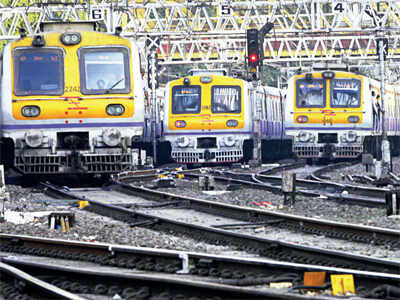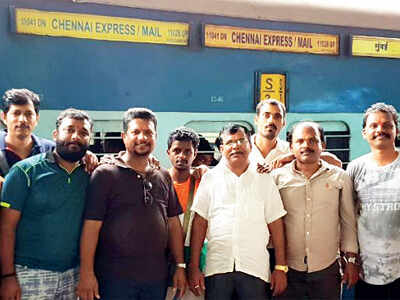Mumbai: 100 locals cancelled in four days thanks to guards’ protest

Even as they claim they are being forced to work ‘over time’, their daily average duty hours stand at just six and a half hours, well below the Indian Railway-mandated eight hours.
Refusal of guards to work ‘over time’ has resulted in the cancellation of over a hundred local trains onWestern Railway in the past four days, inconveniencing lakhs of commuters. However, the impression of weary and exhausted train guards working long hours takes a beating when one takes a quick look at the average number of hours these guards put in and how this ‘over time’ is calculated.
In 2017, the average daily duty hours a guard worked stood at just six and a half hours, well below the Indian Railway-mandated rule of eight hours. But the way the ‘over time’ rules are drafted, many of these guards still managed to claim over time. For example, if a guard is supposed to man three trains in a day, according to the duty schedule, any train he mans above that will qualify him to earn ‘over time’, even though the hours he worked may well fall below eight hours.
administration department . In 2017, the total number of hours the guards had to work in a 14-day period was fixed at 94.16. Anything over this would qualify for ‘over time’. According to a senior Western Railway officer, only in Mumbai is the duty schedule of staff finalised in consultation with union members.
In 2013, the average daily duty hours of local guards of WR was 7.08 hours. In 2017, this came down to six and a half hours. Apart from affecting schedule, this also puts a severe economic burden on Railways in terms of payments for ‘over time’.
When asked why guards themselves are involved in making their duty schedule, a guard told Mirror on the condition of anonymity that the man who works as a guard is the best judge to determine the schedule as he understands the technicality of it. He also added that there are currently 148 vacancies of guards on WR, out of a total sanctioned strength of 535.
However, a senior officer of WR said that guards were holding the railways to ransom with regular agitations as they knew that cancellation of a single train affects around 2,500 people.
Chief Public Relations Officer of WR, Ravinder Bhakar, said, “We are making every possible effort so that commuters are not inconvenienced. Since the past four days, a few services were cancelled during day time due to duty hours issue by crew. But we are trying our best to maintain punctuality in peak hours. Negotiations are going on and we hope the issue will be resolved very soon.”

Refusal of guards to work ‘over time’ has resulted in the cancellation of over a hundred local trains on
In 2017, the average daily duty hours a guard worked stood at just six and a half hours, well below the Indian Railway-mandated rule of eight hours. But the way the ‘over time’ rules are drafted, many of these guards still managed to claim over time. For example, if a guard is supposed to man three trains in a day, according to the duty schedule, any train he mans above that will qualify him to earn ‘over time’, even though the hours he worked may well fall below eight hours.
The guards are helped by the fact that three out of four people who make the duty schedule every two weeks are guards from the unions. The fourth is a railway officer from the
In 2013, the average daily duty hours of local guards of WR was 7.08 hours. In 2017, this came down to six and a half hours. Apart from affecting schedule, this also puts a severe economic burden on Railways in terms of payments for ‘over time’.
When asked why guards themselves are involved in making their duty schedule, a guard told Mirror on the condition of anonymity that the man who works as a guard is the best judge to determine the schedule as he understands the technicality of it. He also added that there are currently 148 vacancies of guards on WR, out of a total sanctioned strength of 535.
However, a senior officer of WR said that guards were holding the railways to ransom with regular agitations as they knew that cancellation of a single train affects around 2,500 people.
Chief Public Relations Officer of WR, Ravinder Bhakar, said, “We are making every possible effort so that commuters are not inconvenienced. Since the past four days, a few services were cancelled during day time due to duty hours issue by crew. But we are trying our best to maintain punctuality in peak hours. Negotiations are going on and we hope the issue will be resolved very soon.”

"COMMUTER SPEAK
You Might Also Like
From around the web
More from Mumbai Mirror
GALLERIES View more photos

























Recent Messages ()
Please rate before posting your Review
SIGN IN WITH
Refrain from posting comments that are obscene, defamatory or inflammatory, and do not indulge in personal attacks, name calling or inciting hatred against any community. Help us delete comments that do not follow these guidelines by marking them offensive. Let's work together to keep the conversation civil.